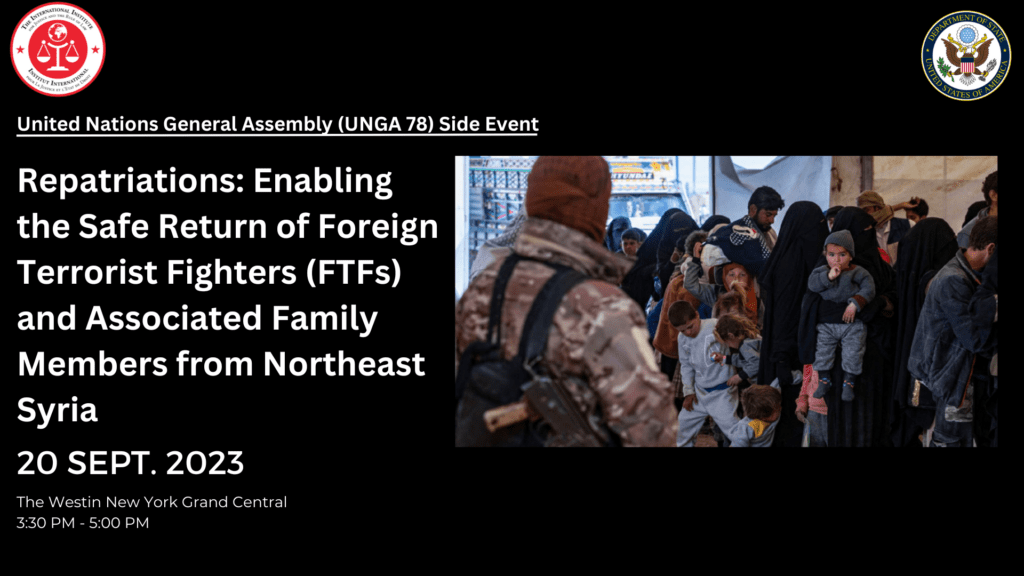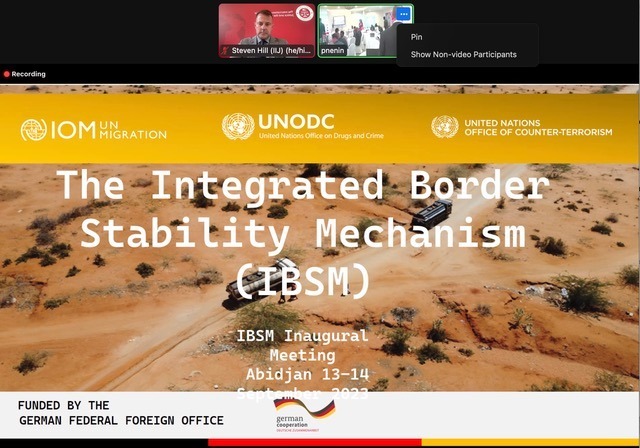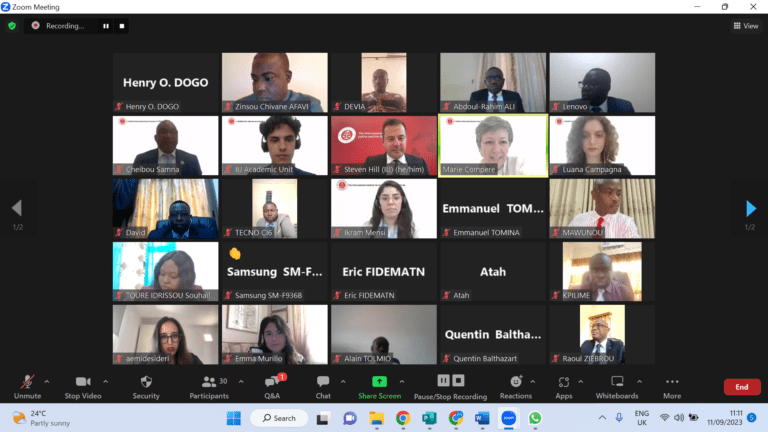Deputy Secretary of State for Management and Resources Richard R. Verma, United States, Deputy Prime Minister and Foreign Minister Fuad Hussein, Republic of Iraq, UN Special Rapporteur on the promotion and protection of human rights and fundamental freedoms while countering terrorism, Fionnuala D. Ní Aoláin, UNICEF Deputy Executive Director Ted Chaiban, and other distinguished experts and government representatives will highlight the ongoing humanitarian and security crisis in the detention facilities and at al-Hol and Roj displaced persons camps in northeast Syria.
This United Nations General Assembly (UNGA 78) side event is hosted by the United States Department of State, in partnership with the International Institute for Justice and the Rule of Law (IIJ)
Westin Grand Central Hotel on September 20, 3:30 pm
Open press and on the record remarks 3:30-4:15pm
Limited seats and pooling available for Press
Zoom Webinar also available: https://us06web.zoom.us/j/85628882149
New York, NY, USA: The side event will address the important security and humanitarian implications of ISIS detention facilities and al-Hol and Roj displaced persons camps from those displaced after the 2019 territorial defeat of ISIS in northeast Syria. Countries will discuss solutions to the challenges to repatriation and returns, as well as rehabilitation, reintegration, and where applicable, prosecution.
Some quotes:
At the June Defeat-ISIS Coalition Ministerial in Riyadh, Secretary Blinken underscored that the status quo in northeast Syria is “unsustainable” and urged countries to take a more active role in addressing the dire humanitarian, human rights, and security conditions in al-Hol and Roj camps and SDF detention centers through repatriations and stabilization support in communities of return.
Blinken: Islamic State Fight ‘Not Yet Done’ (voanews.com)
In a fireside chat in April, Deputy Coordinator for Counterterrorism at the U.S. Department of State Ian Moss highlighted the security concerns of the detained fighters: “Ten thousand ISIS fighters remain in custody there, which is the largest concentration of detained terrorists anywhere in the world. ISIS continues to look for new opportunities to replenish its ranks by trying to free these detained fighters. If they escape, they will pose a threat not only to northeast Syria and the region but to our homelands.”
After her six-day visit to northeast Syria, UN Special Rapporteur on Counter-Terrorism and Human Rights Fionnuala D.Ní Aoláin said, “We cannot hold 10,000 people in a box where no one sees what happens to them and their children, it is fundamentally unacceptable by any measure of a civilised and humane treatment of persons in a condition of detention.
Children forcibly separated from mothers at Syria’s Al Hol, warns top rights expert | UN News
“It is crucial to enhance mutual understanding of the challenges associated with prosecuting repatriated nationals from northeast Syria. Further international dialogue can help provide opportunities to learn from countries that have successfully prosecuted nationals they have repatriated, giving those considering repatriation and those continuing to repatriate nationals the tools and contacts they need to do so successfully.”
Additional Material For Press:
Between 2011 and 2019, tens of thousands of people left more than 60 countries to fight for the so-called Islamic State of Iraq and Syria (ISIS). Today, approximately 2,000 ISIS foreign fighters remain in detention facilities operated by the non-state Syrian Democratic Forces in northeast Syria. The situation presents significant national security and humanitarian concerns that threaten regional and global security.
The United States seeks to mitigate threats posed by detained ISIS fighters to prevent an ISIS resurgence. To date, the United States has facilitated dozens of repatriation operations of detained fighters and associated family members from northeast Syria (NES) to their countries of origin and provided technical advice and assistance to many countries investigating, prosecuting, incarcerating, rehabilitating, and reintegrating their nationals.
At the al–Hol camp, roughly 50% of residents are under 12 years of age. Unless action is taken, they will continue to suffer hardship. Displaced persons, particularly children, require basic life support services and advanced psychosocial support, which cannot be effectively provided in NES.
The situation in NES presents severe humanitarian and local, regional, and international security concerns. Conditions in the camps limit the provision of humanitarian aid and political dynamics in northeast Syria make it challenging for countries to visit and to repatriate their nationals. The United States supports efforts to encourage and facilitate repatriations of fighters and associated family members from NES. The United States’ position is that repatriations are the most durable solution to the ongoing security and humanitarian crisis in NES and encourages countries of origin to repatriate, rehabilitate, reintegrate, and prosecute where appropriate, FTFs and associated family members.
Rehabilitating and reintegrating those who return to their countries of origin from Syria – whether or not they serve prison time – is vital to addressing the cycles of violence and radicalization to violence by ISIS. From Morocco to Indonesia, the United States supports programs that reduce the likelihood that people who return from northeast Syria will continue to support terrorism. The United States also lends its expertise to interested countries of origin in the development of good practices for effective rehabilitation and reintegration of FTFs and associated family members. The United States supports the inclusion of language in counterterrorism-related UN resolutions that recognize the need for UN Member States to develop effective strategies to deal with returnees.
The risk of an ISIS resurgence in NES far outweighs the risks posed by FTFs and associated family members once repatriated. Recognizing this, the United States will continue to offer support to countries of origin to effectively manage their repatriation efforts. As Deputy Coordinator for Counterterrorism Ian Moss said, “We cannot ignore our way out of this problem. We must continue to leverage our counterterrorism cooperation to repatriate the remaining foreign fighters while also mitigating the risks.”
One of the IIJ’s main initiatives is The Returning Foreign Terrorist Fighters (RFTFs) Initiative, which works with policy-makers and practitioners at the local and national levels to adopt and implement coherent policies that foster an inter-agency approach to the rehabilitation and reintegration of terrorist fighters. The initiative helps implement the GCTF’s “Hague-Marrakech Memorandum on Good Practices for a More Effective Response to the FTF Phenomenon,” as well as UN Security Council Resolution 2178.
Although launched in 2015 to focus on FTFs, those combatants who came from other countries to fight, the project pivoted in response to the evolution of the global threat, shifting to focus on returning FTFs, or those fighters who returned from conflict zones to their home countries. Under this Initiative, with support from the Government of the Netherlands, the IIJ spearheaded an important multi-phased program to assist the Governments of Chad and Mali in adapting the Hague-Marrakech Memorandum to their national security contexts. Other projects under this Initiative have supported actions in relevant UN Security Council Resolutions and implementation of the GCTF’s “Good Practices on Addressing the Challenge of Returning Families of Foreign Terrorist Fighters.” The IIJ concluded its work with Chad and Mali and remains committed to assisting both countries in their efforts to include rehabilitation and reintegration programs for terrorist fighters in their national CVE strategies.
Visual identity:

Press Contacts:
Ali Khair
Communication and Outreach Manager, IIJ: khaira@theiij.org
Parvina Abduvohobova
Programme Manager, IIJ: abduvohobovap@theiij.org


